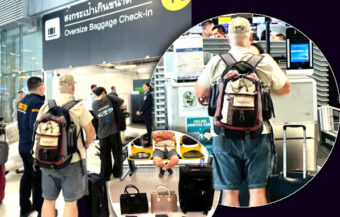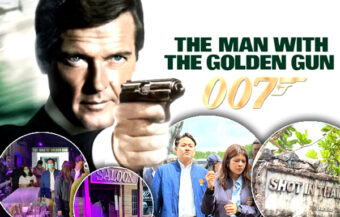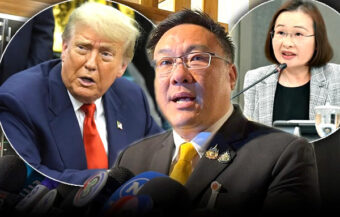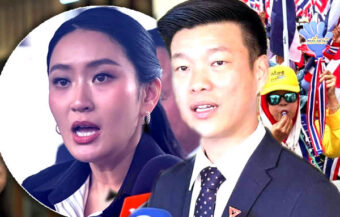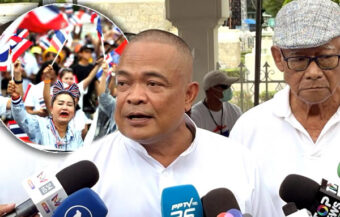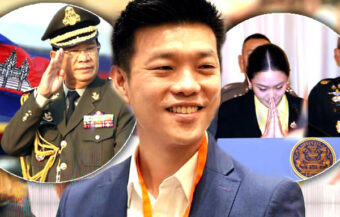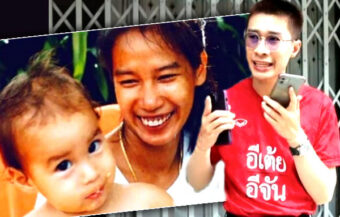It would be a mistake for the opposition parties and even academics to simply dismiss the army leader’s comments as archaic and irrelevant. His comments while politically incorrect and lacking conformity to new western norms, do go to the heart of the matter without beating about the bush.
The Thai army chief in a battling address on Friday left the opposition and academics under no illusion that whatever the commitment or verbal assurances given by the Thai army to stay out of politics, there are limits and those limits are to be found in the 2017 constitution which is now the focus of a campaign by the opposition alliance to change.
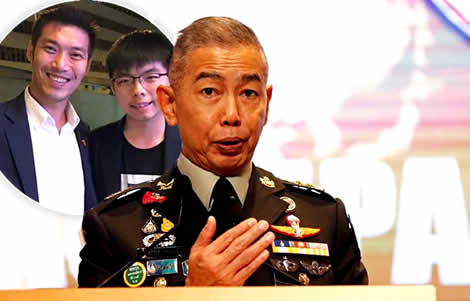
General Apirat Kongsompong is well known in Thailand where he is known as ‘Big Daeng’ (Big Red) by some for his fiery and combative attitude but also for his loathing of communism. The son of a former army chief who led a coup, he is the sort of character that many Thai people have a sneaking regard for even while he is ardently supported by those who support the military in Thailand and who voted for the current government and equally opposed by those on the other side of the political divide.
Last April, the General made another memorable contribution to the political discourse in Thailand
Last April, General Apirat made a striking speech in which he raised many valid points about the ultimate future of Thailand and the danger of a growing liberal orthodoxy spreading worldwide through academia which essentially runs counter to Thailand’s traditional culture and institutions.
Army chief made some sense despite the heavy criticism thrown at him or the political viewpoint
The problem for the general is that more and more Thai young people are attending university and embracing this western influence which in Thailand is still essentially compatible with the values of democracy and the rights of the individual.
But where the General starts to make sense is about the growing acceptance of ‘communistic’ thinking which has become quite aggressive in not only questioning traditional values everywhere in the world but is now moving to prohibit certain points of view.
Speech has caused consternation
The outspoken Thai army chief has caused consternation in Bangkok with the hard-hitting speech delivered on Friday that did not disappoint to draw lines and let the critics of the Thai military know just where they stand.
Political lecture followed sedition charges against political and academics last week
He referred to the controversy last week when officers from Internal Security Operations Command and the 4th Army in the South filed sedition charges with police against 7 opposition party leaders and academics following comments made at a forum meeting on September 28th in Pattani on the subject of the constitution. A change to Article 1 of the Thai constitution was suggested by Thai academic Chalita Bandhuwong of Kasetsart University.
The Director of Social Sciences at the university made the suggestion as a possible part of a resolution to the problem of the southern insurgency which has seen 5,000 people die since 2004.
Such a move is bound to be vehemently opposed by the army and many in Thailand who see it like the general, as an affront to the integrity of the kingdom and a sign of weakness.
‘The blood of our ancestors’ as army chief vowed to oppose certain constitutional changes
‘This article invoked the blood our ancestors had shed to keep this land. I can tell you I will never allow it, even to my dying day,’ General Apirat declared in what was an emotionally charged speech.
In the aftermath of the army chief’s address to an audience of army officers, students and invited media including both local and international reporters, there followed a chorus of criticism and complaint.
However, some opposition politicians chose to respond carefully. They were wise. The speech while fiery and fervent does have one virtue, it was forthright and cut through any pretence.
This is where the army under its current leadership stands. It can also be interpreted as a signal towards the overt moves to orchestrate a campaign and public momentum to alter the 2017 constitution. This constitution essentially allows the Thai military to choose the Prime Minister for the next five years through the involvement of the upper house or Senate.
General Apirat said he had no problem with other political forces in Thailand taking power democratically provided that they did not insist on taking Thailand on the wrong path.
Rekindled memories of the vicious fight against communism in Thailand during the 1960s and 1970
In his speech, the army leader resurrected the spectre of Thailand’s communist insurgency which took off in the kingdom in the mid-60s and was brought to a de facto end in 1980 with a final resolution in 1988.
The Communist Party of Thailand was a movement supported by the Communist Party in China and other neighbouring states but was ultimately soundly defeated by a rising tide of Thai nationalism and growing antipathy towards communism after the horrors seen in Cambodia and indeed anyplace where the flawed ideology had taken root. This era saw Thailand closely aligned with the United States.
Shows pictures of the Thai King fighting with the Thai army in the battle in Loei province
The general on Friday highlighted the role played by Thailand’s then crown prince and now monarch, King Vajiralongkorn when he fought with the Thai army in Loei province near Laos in what was then territory at the heart of a struggle between communism and capitalism in Southeast Asia. He showed some striking photos.
At the time, similar photos were printed and published widely in US news magazines such as Newsweek and Time which breathlessly covered what was then the very real and consequential cold war struggle for the region’s future.
Then crown prince on active duty in the Dan Sai area of Loei in November 1976
The general showed pictures of the Thai King, as a young Captain, taking part in operations and sharing the plight of Thai soldiers in the field in the Dan Sai area of Loie in November 1976. ‘His Majesty was in the operation base, ate and slept like other soldiers. His Majesty visited local residents, gave moral support and fought shoulder by shoulder with brave soldiers,’ General Apirat pointed out.
Warned that many politicians and academics in Thailand today have ‘communistic chips’
The army leader, echoing his speech earlier in the year, referred to the threat from opposition politicians and ‘hard left’ academics. He described them as still retaining their ‘communistic chips’ and claimed they were ultimately bent on taking Thailand on the path to their vision which the army leader strongly suggested inevitably would lead to a challenge to Thailand’s monarchy.
‘They are being shrewd, talking of amending the first article without stating directly what they want, knowing this will affect other articles about the monarchy,’ he told his audience of 500 gathered in the Kittikachorn auditorium at Royal Thai Army Headquarters.
Monarchy, people and military are inseparable
He wanted them to know that the Thai people, the Thai monarchy and the Thai military were inseparable in upholding Thailand’s values and institutions. ‘They’re trying to use religion and separatist movements for political gain,’ Gen. Apirat suggested on Friday. ‘They criticise the military as being an obstacle to democracy, when in fact we work for every Thai citizen.’
Victory in the cold war achieved through national spirit and the Thai Royal family
The army leader attributed Thailand’s winning of its cold war struggle against communism to the royal family, the military and the country’s sense of nationhood. ‘The royal institution had always protected the nation and battles went on for a long time before the Communist Party surrendered in 1988,’ he said in the speech in which the army chief was notably moved by his own words.
Just completed a master’s thesis on fake news
General Apirat recently completed a thesis for his master’s degree focusing on fake news and the power of social media to influence society and the political agenda. He brought this to bear on the current situation in Thailand warning the ‘severe’ propaganda was now being disseminated through social media platforms targeting the young.
He stated that he had seen evidence of a move to turn Thailand against its traditional institutions and towards the path of communism in online commentary.
Predictable negative reaction from academia
The speech has predictably drawn a scathing response from most academics and in some Thai media coverage.
Many have accused the army boss of recreating the same tensions that caused a controversial massacre of protesting students by a mob and unofficial forces at Thammasat University in 1976.
Today’s Thai media invariably refers to the incident sensitively as a tragedy without prying into the politics and political thinking that lay behind it.
Academic – Thai people cannot be limited in pursuit of their own interests and human rights
One academic, Titipol Phakdeewanich of Ubon Ratchathani University took issue with the military leader’s warnings about the discourse on Section 1 of the constitution. He suggested that that section is not related to the monarchy and criticised the speech for its tone. He said that General Apirat spoke as if the military ‘owned’ the constitution.
He warned that such comments could be construed as limiting free speech and also upheld the rights of the public to amend the constitution to pursue their own interests including economic ones and human rights.
Hong Kong protests referred to
The army leader referred to current protests in Hong Kong and warned that such activities in Thailand would not be tolerated.
He used the occasion to indirectly reference the leader of The Future Forward Party, Thanathorn Juangroongruangkit, who appeared in a photograph widely distributed online with Joshua Wong the young activist, recently released from prison, who is at the heart of Hong Kong’s protest movement on October 6th.
The photo according to Mr Thanathorn was taken at an event organised by The Economist magazine and was not uploaded by him or his staff.
Warning to politicians from the Chinese embassy
The picture has since led to a warning from the Chinese Embassy in Bangkok to Thai politicians strongly suggesting that they stay out of the conflict in Hong Kong.
The irony, of course, is that the young people in Hong Kong are protesting against the same Communist Party that Thailand struggled against in the 1960s and 1970s, that the young pre democracy activists want to see staying out of Hong Kong’s affairs.
It may have changed its economic ideology since those times but it is certainly today no beacon of human rights, democracy or freedom.
These were the values that drove the cold war struggle on the winning side but since then, realpolitik, economic imperative and an academic redefinition of democracy are bringing even the western world closer to China and authoritarianism.
Fought against the Communist Party in China
The irony, of course, of General Apirat’s criticism of protests in Hong Kong is that the young people, waving American flags, are fighting the same battle as the Thai army was in 1976 when it was fighting the growing tentacles of international communism sponsored by Beijing’s Communist Party and operating from Laos.
Thailand must be wary of progressive liberalism
Today’s ‘hard left’ academics, to use General Apirat’s term on Friday, have taken ‘communistic’ thinking and applied it to a gradual, relative change in societies which step by step challenges and will ultimately destroy traditional thinking and values everywhere.
Its is called progressive liberalism and it is currently polarising political discourse in the United States and Europe.
Thailand must be wary of it but must also find a way to preserve human rights and free speech as well as preserving its traditional culture and values including the revered monarchy that as the general point out on Friday, has kept Thailand at arm’s length for so long from pernicious global influences and powers.
Think before censuring the army leader
There has been a growing chorus of media commentators in Thailand defending the actions of the authorities in Hong Kong including well established and respected writers.
This also shows just how far things have strayed and how free speech and human rights worldwide have become compromised to a new, modern order that needs to be examined before rushing out to censure the passionate army general harking to the enemy’s next move.
Further reading:
Maybe time for westerners to listen carefully to Thailand’s army leader and conservative Thai voices
Opposition parties lodge defamation and criminal complaints against key army officers on Sunday
Opposition will not put the ฿3.3 trillion 2020 budget bill in danger but plans to scrutinise it


